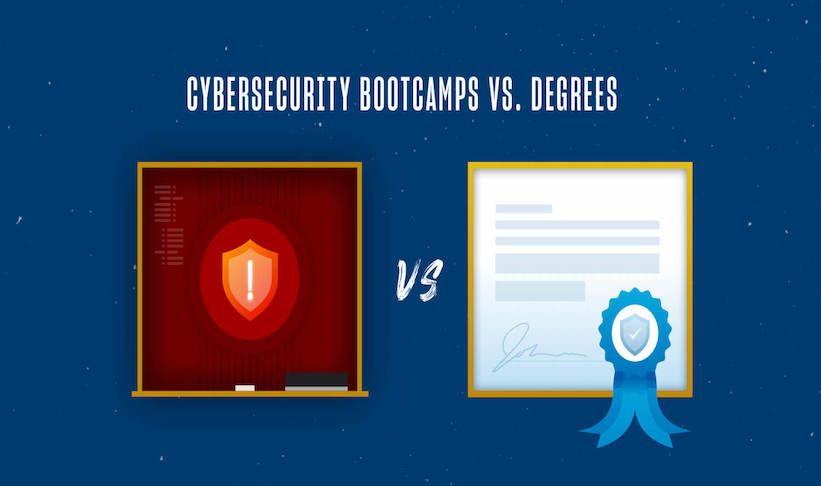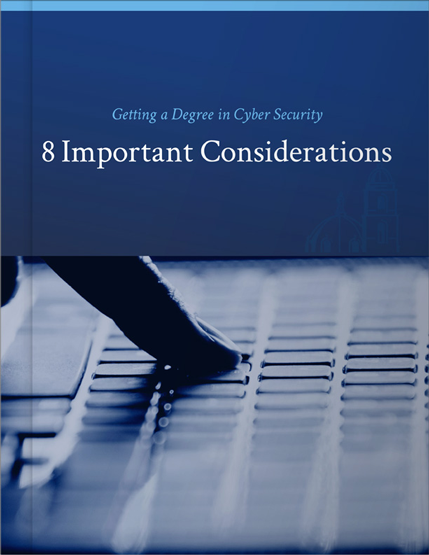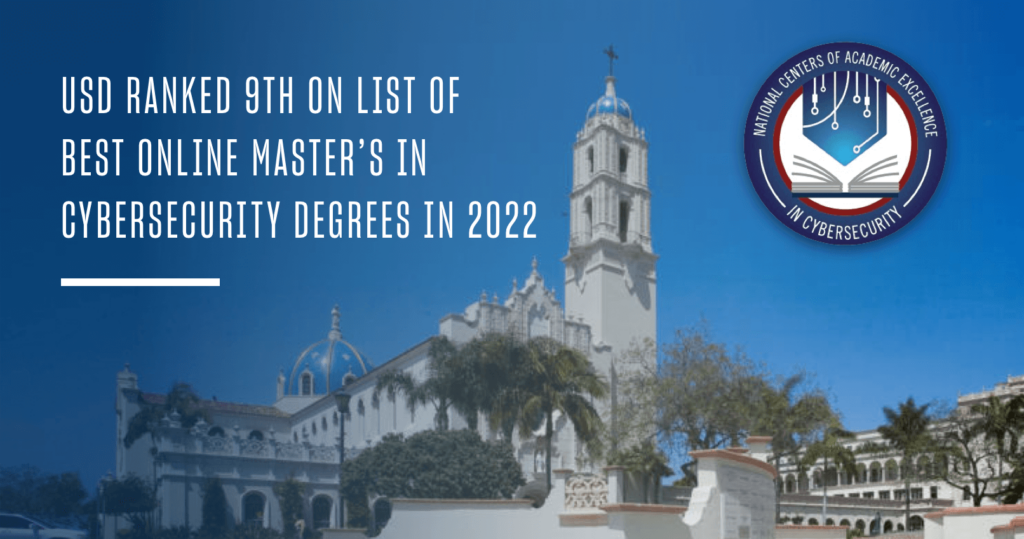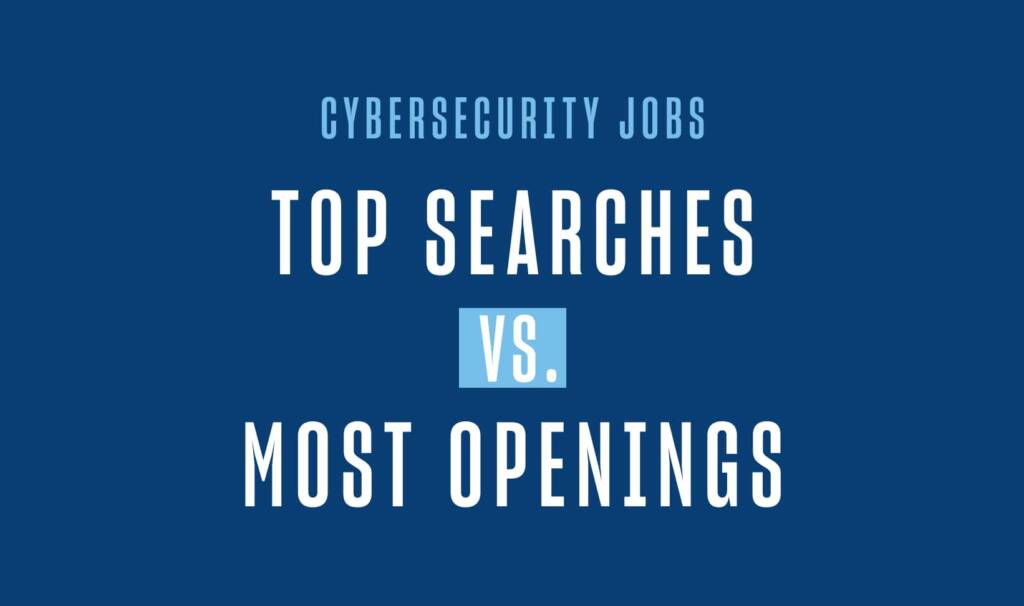The right education, preparation and skills are essential to success in any position — and the field of cybersecurity is no exception. The demand for skilled professionals in this exciting field is high, which means it’s important for those just starting out or considering advancement to obtain the right type of cybersecurity education. The two most popular options are bootcamps and master’s degree programs, but which is the best choice? In this guide, we’ll compare the two in terms of similarities and differences, cost, curriculum and time commitment and provide tips on how to select the right educational path for your cybersecurity career.
What Is a Cybersecurity Bootcamp?
A bootcamp is an intensive educational program that teaches cybersecurity skills and knowledge. Programs may be part- or full-time and typically range from 1 week to 6 months.
Certificate vs. Certification Bootcamps
There are two main types of bootcamps — certificate and certification programs. Certificate programs provide participants with a general overview of cybersecurity concepts while certification programs are specialized and result in a specific cybersecurity certification upon completion.
While both certificate and certification programs can be valuable depending on your goals, they are quite different. A certification is typically looked at as the more significant achievement of the two, as a certification is a specialized credential focused on a targeted topic. Certifications are usually offered by professional organizations or companies and typically require recertification after a certain time period.
A certificate, on the other hand, is comparable to a diploma for entry-level professionals and is usually offered by a college or university. A certificate may be a good option if you are just looking to learn more about the field and are still considering your career options. Certifications are typically geared toward professionals already in the field or with experience and/or education in cyber security.
When it comes to a bootcamp’s format, you can choose from in-person, hybrid and 100% online options. Some bootcamps are completely immersive — in other words, a full-time commitment — while others are part-time with flexibility designed for working professionals.
Bootcamp Curriculum
A bootcamp’s curriculum will largely depend on the program level — beginning, intermediate or advanced. The bootcamp may also be structured differently depending on the format (online self-paced vs. in-person, etc.). Time commitments will also differ.
Most bootcamps provide a syllabus ahead of enrollment, and the curriculum will depend on the goals of the program. General cybersecurity bootcamps teach an overview of topics but may not do a deep dive into the specifics. Bootcamps that result in a specific certification will have a much more specialized curriculum.
Examples of popular cybersecurity bootcamps that end in a certification include:
- The Certified Information Systems Security Professional (CISSP) — This certification is a requirement if you want to work at the Department of Defense. Even if you don’t, the CISSP is a globally-recognized certification for experienced professionals that can open the door to more senior-level positions.
- Certified Information Security Manager (CISM) — This certification focuses on governance, risk management, compliance and international security measures. It is geared toward managers who design, oversee and assess an enterprise’s information security. It meets the strict conditions of ISO/IEC Standard 17024.
- Certified Information Systems Auditor (CISA) — This certification focuses on auditing, controlling, monitoring and assessing information systems and can add a significant pay boost to a cyber security professional’s annual salary.
Comparing the Cost of Cybersecurity Bootcamps vs. Degrees
The average cost of a bootcamp is anywhere from $12,000 to $20,000 (with some one-week bootcamps costing far less), and the cost of a master’s degree typically ranges between $30,000 and $120,000, depending on the school, program and degree. A master’s degree program is typically more of a time investment — sometimes up to a few years.
Undergraduate degrees typically cost around $35,551 per student per year (including books, living expenses, supplies, etc., which for a 4-year degree totals approximately $142,204).
A master’s degree in cybersecurity may hold more long-term value if you want to invest in your career, especially if you think you’ll ever consider jobs that require an advanced education.
It’s worth noting, however, that employers may offer tuition reimbursement, which can help offset the cost. Bootcamp programs or higher education institutions may offer financial assistance, and resources such as Scholarships.com are definitely worth exploring.
Cybersecurity Career Paths for Bootcamp and Degree Program Graduates
Graduates of certificate bootcamps may want to explore entry-level cybersecurity positions such as Cybersecurity Specialist/Technician, Cyber Crime Analyst/Investigator, Incident Analyst/Responder and IT Auditor.
Some positions may require a specific cybersecurity certification or an advanced degree, but this should be specified on the job posting.
Higher-level positions are primarily open only to those with advanced degrees and/or training.
Cybersecurity Bootcamps vs Degrees — Which is Right for Me?
Bootcamps and degree programs are often a significant investment of time and money, so it’s important to consider all aspects of each before signing up.
Consider a bootcamp if you’re thinking about a career in cybersecurity and would like to obtain more information about the field. In general, cybersecurity bootcamps that result in a certificate of completion are a good choice if you’re on the fence or would like to obtain more of an overview. Plus, these types of programs provide a solid cybersecurity foundation that can help you get into a master’s degree program if that’s something you’d like to pursue in the future.
If you’re looking for a particular cybersecurity certification, a bootcamp makes sense, especially since that is often the only way to obtain certification.
Consider a master’s degree program if you’d like to take the next step in advancing your cybersecurity career. A bootcamp is often considered “supplemental education” and can be taken either before or after a master’s degree program.
A master’s degree typically takes longer to obtain, but many programs offer flexible online options for working professionals. While any type of advanced education is typically more expensive than a bootcamp, many companies and organizations offer some type of tuition reimbursement. Scholarships and other flexible funding options are also available.
If you’re exploring master’s degree programs, we invite you to consider the University of San Diego, which offers two advanced degrees in cybersecurity.
The Master of Science in Cyber Security Operations and Leadership, which is 100% online, is ideal for professionals who are interested in gaining leadership skills and a deeper understanding of cybersecurity topics, theories and concepts.
USD’s Master of Science in Cyber Security Engineering is geared toward those with an engineering background who aspire to become security engineers. Offered both online and in person, this program has been designated as a National Center for Academic Excellence.





